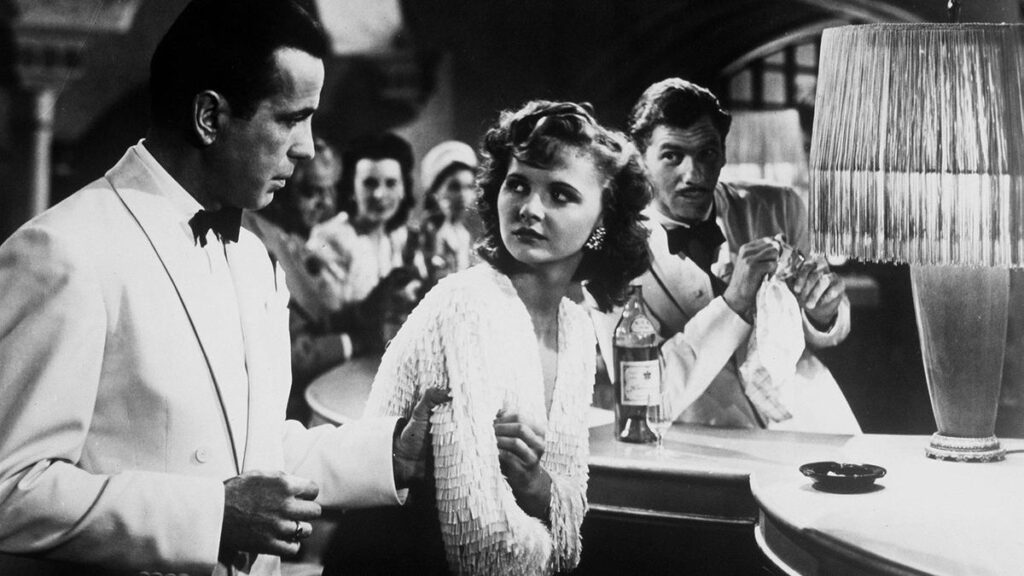A colourful black-and-white movie review.
Time spent in the logistical limbo of travel is basically the same as death, says my clever friend Matthew.
Certainly, hours spent in airports waiting to board are lost forever, as business travellers know too well. High frequent flyer status is simply evidence of a tactical failure somewhere.
Exclusive airline lounges are installed to keep gold and platinum strangeness out of the way of normal people, but all privilege is temporary.
Last week, as my body was ruthlessly transported in a tight middle seat to Singapore, the inflight classic movie channel flew my free spirit back to Morocco.
Not that I have ever been there, other than via the 1942 film Casablanca.
Nowadays it’s a little unsettling to watch Humphrey Bogart and Ingrid Bergman in all their glory.
Firstly, because it makes you ponder how much older you are now than they were then, and also every one of that cast was gone by 2016.
They are captured forever young, replaying those scenes and songs in Rick’s Café Américain, and generations to come will relate to the eternal problem they were exploring — how humanitarians should behave in the fight for survival.
As Victor Frankl humbly put it — and who are we to doubt him — in the Nazi death camps, “the best of us did not survive.”
Bogie was born in 1899, in time for the depression, prohibition and Broadway on the rise.
He was 42 and Bergman was just 27, when they both radiated incredible nuance in black and white, and effectively launched themselves into the crowning decade of their careers.
Casablanca was then part of French Morocco, ruled from Vichy, and served as a staging point for refugees hoping to escape to Portugal, enroute to the fabled United States.
Prolific Hungarian American director Michael Curtiz managed to frame personal motivations in the shadow of tectonic world events with terrific precision.
His depiction of the desperation and guile of the war-weary in transit, and the “usual suspects” who preyed upon them, had both light touch and deep sympathy.
Curtiz’s sister and her children were as yet to die in Auschwitz, but his fear for humanity dominates, even as his desperate characters learn that their diamonds don’t count for much anymore. Most of the extras and many of the actors had been refugees themselves, and their experience shows through.
The film scored three Academy awards in 1944 and plainspoken critic, the late Roger Ebert, said Casablanca should be listed as a movie with a capital M.
Cataclysmic global events seem less distant now than they did a decade ago.
The bruising, stumbling decline of democracy and public discourse in the United States; the amoral, inhumane destruction in Ukraine and Gaza, and the uncertain aspirations of our own youth observing the inexorable rise of AI and property prices, combine to make us uneasy.
Australians are used to being isolated, protected from international storms, but even lucky countries shift in their seats in 2025.
Mentioning Palestine, and the urgent need for a compassionate two-state solution amidst the deathly rubble, should not be controversial — it is Australian government policy — but everyone is on tenterhooks and inflamed.
Self-censorship is spreading among countries and institutions that proudly spoke out in easier times.
Doctors don’t choose their patients; we treat anyone with a wound and don’t get too caught up about why they have it.
It’s part of that whole Hippocratic business; we just want less suffering and death, not more.
As Bogie’s Rick said, “I’m no good at being noble, but it doesn’t take much to see that the problems of three little people don’t amount to a hill of beans in this crazy world.”
We need more people like Rick, who can find their conscience when it counts, to do the selfless things — not all the time, just more often.
We are all just trying to get our families home to somewhere safe.
Andrew Miller is an anaesthetist and director of the Federal AMA
https://thewest.com.au/opinion/andrew-miller-the-classic-casablanca-gives-an-introspection-that-shows-why-we-need-to-find-our-conscience-c-20324639


